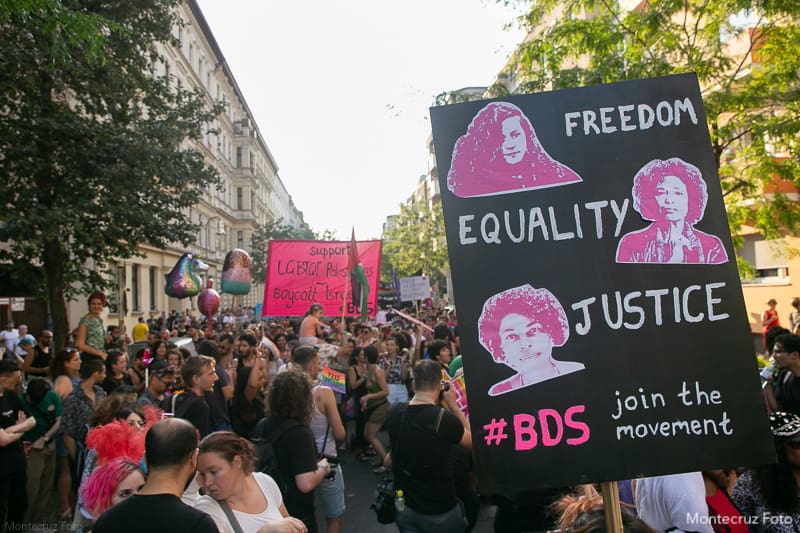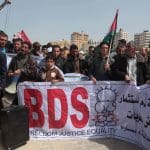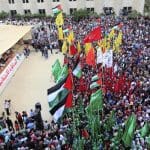
(Originally published in May 2010)
Editor’s note
The Palestinian call for Boycott, Divestment and Sanctions (BDS) was launched 10 years ago, providing Palestinian leadership and strategic guidance to what had been a disparate set of ad hoc boycott actions around the world. Al-Shabaka takes this occasion to republish Policy Advisor Omar Barghouti’s policy brief, which addresses the basic principles and strategies underpinning the BDS movement that have remained constant since its founding.
The brief tackles the reason why the movement has not specified a political outcome; highlights the “unambiguous invitation” to Israelis of conscience to support the Call and the efforts of the Zionist left to undermine it; and points to a key reason for the movement’s success – the freedom to design BDS actions that are context specific, gradual, and sustainable. While BDS opponents accuse the movement of seeking to “destroy Israel” Barghouti makes it clear that the aim is simply to hold Israel accountable to international law, and that Western civil society bears a unique responsibility to do so given Western governments’ complicity in enabling Israel’s rights violations.
Overview
While media attention over the past few months has focused on a brewing third Palestinian intifada in response to the expansion of Israeli settlements in the Occupied West Bank and East Jerusalem, Al-Shabaka policy advisor Omar Barghouti argues that a far more widespread, nonviolent grassroots movement originating in the Occupied Palestinian Territories has been building and spreading around the world. He reviews the formation and evolution of the boycott, divestment, and sanctions (BDS) movement, including its rights-based (as opposed to solutions-based) approach, its collective leadership, its call to Israelis of conscience, and its promotion of context-specific strategies.
The Trigger for BDS
Not only friends of Palestinian rights recognize the potential of the Palestinian Boycott, Divestment and Sanctions (BDS) campaign; foes do too. In May 2009, at AIPAC’s policy conference, Executive Director Howard Kohr warned that BDS was reaching the American mainstream and “laying the predicate for abandonment [of Israel].” 1
Kohr added, “This is a conscious campaign to shift policy, to transform the way Israel is treated by its friends to a state that deserves not our support, but our contempt; not our protection, but pressure to change its essential nature.”
BDS does indeed challenge Israel’s “essential nature.” Rooted in almost a century of civil resistance to Zionist settler colonialism, the Palestinian Civil Society Campaign for BDS against Israel was launched on 9 July 2005, 2 ushering in a qualitatively new phase of resistance to Israel occupation, dispossession and apartheid against the indigenous people of Palestine. 3
The global campaign in response to the Palestinian BDS Call, which is guided by its Palestinian leadership, has made significant inroads into the Western mainstream over the past few years. The global BDS Campaign asserts a new, rights-based discourse in dealing with the question of Palestine. By so doing, it decisively exposes the double standard and exceptionalism with which the United States and most of the West have to varying degrees treated Israel ever since its establishment through the carefully planned and methodically executed campaign of forcible displacement and dispossession of the majority of the Palestinian people in the 1948 Nakba. 4 The official western collusion reached its height when Western states collectively ignored the historic advisory opinion issued by the International Court of Justice on 9 July 2004, which affirmed that Israel’s colonial Wall and settlements were contrary to international law – at a time when Palestinians were still reeling from Israel’s violent take over of cities and refugee camps in the occupied West Bank in 2002. This factor was the direct trigger for the BDS Call a year later.
Rights-Based Approach
The BDS Call identifies the fundamental rights that correspond to the three main segments of the indigenous people of Palestine. Based on international law and universal principles of human rights, the Call urges various forms of boycott against Israel until it fully complies with its obligations under international law by:
- Ending its occupation and colonization of all Arab lands occupied in June 1967 and dismantling the Wall;
- Recognizing the fundamental rights of the Arab-Palestinian citizens of Israel to full equality; and
- Respecting, protecting and promoting the rights of Palestinian refugees to return to their homes and properties as stipulated in UN resolution 194.
The BDS Call, signed by over 170 Palestinian organizations, political parties, trade union federations, and mass movements, expresses the collective aspirations of the Palestinian people by asserting that only the fulfillment of the Call’s three basic demands would satisfy the minimal requirements for the people of Palestine to exercise the inalienable right to self determination.
The BDS Call has laid “the predicate” for transcending the failed official Palestinian policy of reducing Palestinian rights to the attainment of a Bantustan under Israel’s overall control.
It presents a popular Palestinian response to the incessant concessions by the so-called leadership over basic rights. Palestinian officials, lacking a democratic mandate and running after the trappings of power, narrow economic interests, and privilege, have through years of a US-Israeli designed and managed “peace process” effectively surrendered the right of return as it is defined by the UN; accepted Israel’s occupation and colonization of key parts of the West Bank, including in East Jerusalem; expunged the 1948 Palestinians, citizens of Israel, from the very definition of the Palestinian people, indirectly legitimizing Israeli apartheid; forsaken the moral high ground by accepting a symmetry between the “claims of both sides;” and played along Israel’s public relations campaign of portraying its colonial conflict with the Palestinian people as merely one over some disputed land.
By avoiding the prescription of any particular political formula, the BDS Call insists, instead, on the necessity of including the three basic, irreducible rights above in any just and legal solution. It presents a platform that not only unifies Palestinians everywhere in the face of accelerating fragmentation but also appeals to international civil society by evoking the same universal principles of freedom, justice and equal rights that were upheld by the anti-apartheid movement in South Africa and the civil rights movement in the United States, among many others.
In this way, the BDS movement has dragged Israel and its well-financed lobby groups onto a battlefield where the moral clarity of the Palestinian struggle for self determination, justice, freedom and equality neutralizes — even outweighs — Israel’s military power and financial prowess. BDS is the classic right over might paradigm, with the international public increasingly recognizing that Israel’s criminality and impunity place a moral burden on all people of conscience to act fast, and with effectiveness, political suaveness and nuance.
Collective Palestinian Leadership and Reference
In 2008, the formation of the Palestinian BDS National Committee, the BNC, created a unified Palestinian reference and guiding force for the global BDS movement. The BNC is a broad coalition of leading Palestinian political parties, unions, coalitions and networks representing the three integral parts of the people of Palestine: Palestinian refugees; Palestinians in the occupied West Bank (including Jerusalem) and Gaza Strip; and Palestinian citizens of Israel. 5
An important component of the BDS Call that is often overlooked is the unambiguous invitation to conscientious Israelis to support the Call, recognizing the important role anti-colonialist, anti-racist – i.e., anti-Zionist — Israelis can and ought to play in ending Israel’s criminal impunity and apartheid.
A fast growing group of principled Jewish-Israeli supporters of BDS fully recognizes this Palestinian reference. 6 Some Zionist “left” voices, on the other hand, have recently presented their own versions of “BDS,” after the movement started having a palpable impact on the western mainstream. In several instances, these voices have ignored or undermined the Palestinian BDS Call and leadership as the reference for the global movement, in an attempt to project themselves as an alternative, Israel-centered reference. Their ultimate objectives are clear: salvaging their lost, unwarranted agency and inflated sense of entitlement to speak on behalf of the Palestinians; forestalling any challenges to Israel’s system of apartheid and denial of refugee rights by circumscribing Palestinian rights to the “ending the occupation” in return for dropping “all claims” paradigm; and restraining solidarity initiatives to conform to their selective and ideologically motivated agendas.
As in the struggle against South African apartheid, genuine solidarity movements recognize and follow the lead of the oppressed, who are not passive objects but active, rational subjects that are asserting their aspirations and rights as well as their strategy to realize them. 7
Moral Consistency and Context-Specific Strategies
The BDS Call builds on many Palestinian and international initiatives for boycotting Israel and/or divesting from it, particularly since the UN Conference Against Racism in Durban in 2001. Whereas moral consistency and commitment to universal human rights are the overriding principles of the global BDS movement, operationally, BDS is based on three basic principles: context sensitivity, gradualness, and sustainability. Conscientious academics, intellectuals, human rights activists and civil society organizations in any given country, the movement recognizes, know best how to apply BDS most effectively in their particular circumstances, taking into consideration their respective political realities, constraints and potential.
Several BDS recommendations were adopted at a civil society forum held in Bilbao, the Basque Country (Spain), in November 2008, with the participation of tens of Palestinian, European and Israeli progressive organizations endorsing BDS. 8 Some of these recommendations are included in the following BDS campaign priorities, which reflect the collective experiences in the BDS movement since its inception in 2005:
- Promoting a general boycott of all Israeli products and services until Israel fully complies with its obligations under international law; 9
- Promoting a boycott of all Israeli academic, cultural and tourist institutions that are complicit in maintaining the Israeli occupation and apartheid regime. 10 This demands raising awareness among academics, artists and cultural workers about the role these institutions have played in perpetuating injustice and colonial oppression;
- Implementing ethical investment principles by trade unions, faith-based organizations, local councils and national pension funds, among others, by divesting from Israel Bonds and from all companies, banks and other financial institutions that profit from or are otherwise complicit in Israel’s violations of international law and Palestinian rights. Major Christian Palestinian figures recently issued “A Moment of Truth,” a document by the Palestine Kairos group calling on churches around the world “to say a word of truth and to take a position of truth” and explicitly endorsing BDS “as tools of justice, peace and security;” 11
- Promoting divestment from and/or a realistic boycott of products of companies — whether Israeli or international — that are implicated in violations of international law and human rights, such as Elbit Systems, BAE, Veolia, Alstom, Eden Springs, Agrexco-Carmel, Ahava, Lev Leviev Diamonds, Motorola, Caterpillar, among others;
- Promoting ethical pilgrimage to the Holy Land by directly benefiting Palestinian hotels, restaurants, coach services, guides, etc., denying Israel, its airlines and its apartheid institutions the lucrative revenues that accrue from such pilgrimage;
- Applying public pressure to ostracize the Jewish National Fund (JNF) and deny it its current legal status in most western countries as a tax exempt, charitable organization;
- Lobbying local councils and regional governments to strictly apply domestic and international laws which urge them to preclude from public contracts companies that are involved in “grave misconduct,” especially at the human rights level;
- Applying effective pressure on public officials and political parties to heed Amnesty International’s call for an immediate arms embargo on all parties of the “conflict;” 12
- Calling for an immediate suspension of all free-trade and other preferential trade agreements with Israel due to its violations of international law and Palestinian rights; 13
- Applying pressure for the immediate and unconditional implementation of the recommendations included in the Goldstone Report, adopted by the UN Human Rights Council and backed by the UN General Assembly and almost every major international human rights organization, to hold Israel accountable for committing war crimes and crimes against humanity.
In challenging Israel’s oppression, the global BDS campaign does not call for Israel to be treated according to higher or lower standards than those that apply to any other state committing similar crimes and violations of international law. Although Israel is by no means the most atrocious offender around the world, it is the only ongoing offender that has constantly been treated as an honorary member of the Western club of “democracies,” with the Holocaust cynically — and quite irrelevantly — summoned as a smokescreen to cover up this collusion. The virtually unparalleled state of exceptionalism and impunity that Israel enjoys today allows it to pursue its agenda of apartheid, ethnic cleansing and slow-genocide against the indigenous people of Palestine without any regard to international law or concern about possible punitive measures for violating it. As some progressive Jewish intellectuals have stated recently, “Never Again!” must always be understood to mean: never again to anyone. 14
Western civil society carries a unique responsibility to hold Israel accountable to international law due to the incomparable level of complicity of Western governments in sustaining Israel’s system of colonial and racial oppression through vast diplomatic, economic, academic, cultural and political support – all in the name of Western citizens and using their tax money. Deep complicity engenders profound moral responsibility. While several Arab regimes – including parts of the Palestinian Authority – are also colluding in the implementation of the Israeli-US agenda in the region, their impact is considerably less significant that that of Western states in sustaining Israel’s three-tiered system of oppression. 15
Collusion and moral duty aside, the responsibility to promote and support the BDS campaign against Israel also derives from common interest. While the US and other Western states fund Israel’s endless wars and system of apartheid to the tune of billions of dollars every year, millions of children in the West are still left behind in substandard housing, inadequate or non-existent health care, poor education and an establishment that effectively disenfranchises them when they grow up from effectively participating in the democratic political process. A progressive transformation in US and European Union (EU) priorities from directing these nations’ great human and material resources into wars and imperial hegemony on the international scene to investing in universal health care, dignified housing, a school system that is conducive to critical and contextual learning and development, decent jobs, and reversing the fatal damage to the environment, is not only good on its own merits for the peoples of the West; it is also great for the world — for Iraq, Afghanistan, Pakistan, Latin America, Africa, and, most certainly, Palestine.
The global BDS movement for Palestinian rights presents a progressive, anti racist, sustainable, moral and effective form of civil, non-violent resistance for Palestinian human rights that is also fast becoming one of the key political catalysts and moral anchors for a strengthened, reinvigorated international social movement capable of ending the law of the jungle and upholding in its stead the rule of law, reaffirming the rights of all humans to freedom, equality and dignified living.
Indeed, BDS may well prove to be the most powerful form of popular Palestinian resistance ever.
- http://www.aipac.org/Publications/SpeechesByAIPACLeadership/HowardKohr.pdf
- http://bdsmovement.net/?q=node/52
- For an in-depth analysis of Israel’s apartheid and colonial system see the strategic position paper published by the BDS National Committee (BNC), titled “United Against Apartheid, Colonialism and Occupation,” October 2008: http://bdsmovement.net/files/English-BNC_Position_Paper-Durban_Review.pdf
- For more on the systematic forcible displacement of the Palestinians see: Ilan Pappe, The Ethnic Cleansing of Palestine, Oneworld. (Oxford: 2007).
- BNC members include: Council of National and Islamic Forces in Palestine, General Union of Palestinian Workers, Palestinian General Federation of Trade Unions, Palestinian NGO Network (PNGO), Palestinian National Council for NGOs, Federation of Independent Trade Unions, Global Palestine Right of Return Coalition, Occupied Palestine and Syrian Golan Heights Initiative, General Union of Palestinian Women, Union of Palestinian Farmers, Grassroots Palestinian Anti-Apartheid Wall Campaign (STW), National Committee for Popular Resistance, Palestinian Campaign for the Academic and Cultural Boycott of Israel (PACBI), National Committee to Commemorate the Nakba, Civic Coalition for the Defense of Palestinian Rights in Jerusalem (CCDPRJ), Coalition for Jerusalem, Union of Palestinian Charitable Organizations, Palestinian Economic Monitor, Union of Youth Activity Centers-Palestine Refugee Camps.
- See, for example: http://boycottisrael.info/ and http://www.alternativenews.org/
- The Cairo Declaration, produced and endorsed by representatives of solidarity groups from more than 40 countries who protested in Egypt as part of the Gaza Freedom March, provides a distinguished example of such principled solidarity: http://cairodeclaration.org/
- http://www.bdsmovement.net/?q=node/213
- For arguments against strategically restricting the boycott to “settlement products” see: http://electronicintifada.net/v2/article9948.shtml
- For more on the academic boycott see: www.PACBI.org. Also a recent study published by the Alternative Information Center documents many aspects of the complicity of the Israeli academy in Israel’s oppression of the Palestinian people: http://alternativenews.org/publications/econoccupation/2223-the-economy-of-the-occupation-23-24-academic-boycott-of-israel.html
- http://www.kairospalestine.ps/sites/default/Documents/English.pdf
- Regardless of the valid criticism against Amnesty’s morally and legally flawed equation between the occupying power on the one hand and the people under occupation and their resistance movement on the other, this call still includes a ban on arms trade with Israel and on shipping arms to Israel through any country’s ports and airspace.
- The EU-Israel Association Agreement and the MERCOSUR-Israel FTA are high priority targets.
- See, for instance, Naomi Klein’s statements in this regard at a lecture last year in Ramallah covered by Haaretz –Yotam Feldman, Noami Klein: Oppose the State Not the People, Haaretz, 2 July 2009: http://www.haaretz.com/hasen/spages/1097058.html
- The PA as an entity plays an indispensable role in legitimizing Israel’s claims and in whitewashing its violations of international law and war crimes. Gradually dissolving the PA and the democratic, bottom-up take over and reconstruction of the PLO to reinstitute it as the sole legitimate representative of the Palestinian people everywhere, inclusive of all major national and Islamist political parties, would deny Israel its most valuable asset and help undermine its regime of oppression against the people of Palestine.












